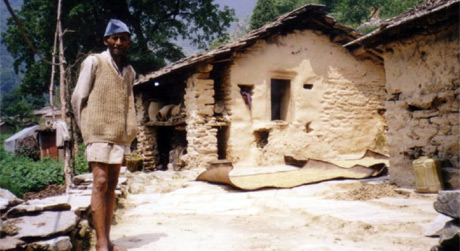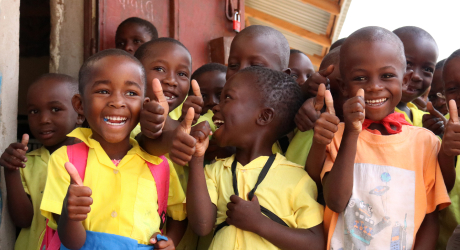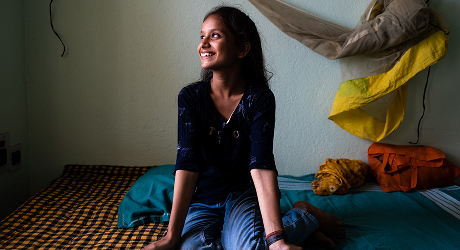Footprints Project
Since 2005, travelers like you have helped us change the world through micro-donations.

-
A total of
5670
Travelers
-
donated
$12929.11
(100% funded) -
to help improve
Energy
-
impacting
122
people -
in
India
This project report provides an update on the final phase of installation of 70 solar home lighting units into the villages of Jatoli, Libhurgur, Dhoor, Muladhoor, Shilshor, Okhalia, Ritang & Jhagai. The units include a light, a portable torch and mobile phone charging outlet and replace an expensive dependency on kerosene-burning lamps.

Photo: Each household got a solar unit like this. It included a solar-panel and battery, household lights, torch and mobile charging outlet.
Project Activities
Two local community members were employed for the installation process at each of the two work sites. Jai, Dhan, Digember & Dayal worked on the villages proximal to their own home and their indigenous knowledge was invaluable.
Transportation of the goods varie depending upon location, for the houses of, Dhoor, Muladhoor, Libhurgur, Shilshor, Okhalia, Ritang and Jagai the solar units were collected every morning from the PEAK building by our ‘backpack wearing’ installers Dhan & Jai to carry to the work site. The Jatoli solar units were transported from Khati to Jatoli by nine mules over 7 ‘Himalayan’ kilometres.
The team attached clear plastic bags over the lens of the bulb with rubber bands to ensure there was no smoke damage from the open fires used for cooking.
Purchase of spare batteries, lights, extra cable and motherboards to ensure ongoing maintenance is possible.
Lighting was also installed in the ‘Library’ for Primary School classes. It’s wonderful to start class on a winter morning, turn on the light and have the children bow their heads to give thanks to ‘Bhagwan’ for having light... or cheer!
All packaging (i.e. cardboard, polystyrene etc) from the solar units was sorted into different categories for use in primary school Art classes in Khati, with all non reusable items burnt on site.
Community Involvement
PEAK staff conducted a group training workshop for women and men on the use of the system which fostered strong community engagement and at the local ‘chai stall’ we discovered discussion was rife in all aspects of solar lighting! Each family was present during the installation process where local employees reiterated what had already been covered in the workshops and fielded any solar related questions.
It was of particular importance to have a female staff member present during the installation process to ensure that the women who are often the main beneficiaries of the lighting for household tasks had a ‘voice’ on the placement of lights. This enabled the women to express their opinions in front of other household members which had a positive influence. As a result lights were positioned in appropriate key areas with the small night light frequently requested to be installed in the cattle shed beneath the house for ease of milking livestock.
For the project to be a complete success the employment of a local ‘solar technician’ was paramount. PEAK found a willing participant in one of the employees – Digember - who imbibed every word on solar, was keen on all aspects of the job & kept his own system scrupulously clean with a special ‘cloth hat’ for his battery – we knew this was the man for the job!

Photo: solar maintenance training with two local technicians and Peak's Scott Bartholomew on the right.
Project Outcomes:
This project had very clear cut outcomes. Proper lighting is essential to the running of any household and the Solar Home Lighting Units:
- have ‘eased’ the burden of purchasing kerosene
- provided an efficient low maintenance lighting source to every household for daily chores and children’s night time studies
- paved the way for any future micro enterprise projects.
Project Challenges:
These villages and houses were ‘out there’ in terms of their isolation from each other and topographically challenging due to their high elevations.
Political logistics were another factor. With India coming in at 136th globally for ease in which to do business the purchasing and shipping phase was slow.
The local predilection for ‘having a go’ and attempting to charge mobile phones off the battery proved disastrous on several occasions leading to the total ‘rebuild’ of several systems from the previous Khati project - fortunately this issue has been ameliorated with the new systems mobile phone charging capabilities.
Comments from Bonnie Flynn, Project coordinator.
Jatoli is situated on a steep slope and it was amazing to stand at the bottom of the hill at night and see the warm glow of dotted lights emanating through doorways or windows. This project was exceptionally heart warming, life affirming and gratifying.
In intermittent snow and sub zero temperatures (-8 degrees) our employees turned up early on the allocated day with big smiles and plenty of warm clothes ‘ready for action’. This set the tone for the entire project that took on a jovial atmosphere at each household with hospitality being overwhelming.
Community spirit and participation, particularly in Jatoli, being a centralised village, was overwhelming with everyone eager to pitch in and help & I don’t think I ever recall having so many cups of tea or so much food thrust in front of me - ever.
And at the end our stay in Jatoli, householders came to us in a steady procession with bags of ‘chim’ from the fields (red kidney beans) for us to take home to Khati - so much so, the goods necessitated a mule to Khati and a tin trunk purchase for storage!. It was innocent actions like these we found touching.
Throughout this (and prior) projects PEAK has developed a strong community network within the village of Khati, and now across the region, that has led to a solid understanding of the issues facing those in remote Himalayan locations. This will enhance on the ground solutions to everyday needs in future projects.
(June 2012)

Photo: Dipika eating her first meal under light - ever
INTERIM REPORT (August 2011) - THE PLANNING STAGE
This interim report provides an overview of the progress and challenges of the solar home lighting project from conception through to the delivery of the units to the village of Khati where they are currently stored in PEAK’s building. The final phase, of installation into Jatoli, Dhoor and Libhurghur villages is scheduled for completion at the end of 2011.
Planning stage
The initial planning stages of the solar home lighting project began after PEAK monitored the initial project where 65 solar units were installed into Khati village in 2008. Based on the success of the Khati project, PEAK decided to extend the reach of the solar project to villages that are similarly bereft of grid electricity. In the intervening time frame technology advanced and luminosity of the bulbs are now enhanced with Nichia LEDs. The new units consist of a 12V/10W solar panel, 12V/7Ah battery, two 42 LED lights, one 6 LED night lamp, mobile phone charging outlets and a 19 LED portable torch.. The units were purchased from the Grameen Surya Bijlee Foundation (GSBF) who have purpose built the systems for developing world conditions. In addition to the acquisition of 80 solar units, the high rate of the Australian dollar enabled PEAK to purchase two Lead Acid 12V/180 Ah batteries and a 50W monochrystalline panel from the Uttarakhand Renewable Energy Development Agency (UREDA) for dual use in the Classroom (ostensibly for lighting but has also paved the way for future computer use) and Community Environment Centre.

Photo: Mule Wallahs (L) Mohan & (R) Kusal unloading goods.
Purchasing the units
A portent of the difficulties to come, lay in the spectacular monsoon of 2009 that coincided with our arrival that not only took many lives but saw sections of the road from Bharari to Saung (where the goods were to be transported) totally obliterated rendering it impassable to vehicle traffic for months.
As a fledgling organisation in 2008 PEAK undertook the Khati Solar Home Lighting Project and learnt of the intricacies of bureaucracy and business in India. These 'lessons' enabled staff to undertake this project with the full knowledge that ‘anything that can go wrong does go wrong and some!’ The necessity of a Sales Tax Advocate to ensure the ease of transition of the goods from GSBF in Mumbai to PEAK in Uttarakhand was realised after the ‘debacle’ regarding tax issues on our first project. This process and inherent difficulties were significantly reduced with the help of Khim Singh who proved to be a diligent Tax Advocate & Tulsi Devi (Pradhan of Waucham) whose signature was necessary on all relevant paperwork in conjunction with Nandan & Dhan - two community members whom verified the village beneficiaries. Despite the time spent between offices and government departments, we managed to keep smiling (aided by comic relief with the incongruous image of Dhan expected to carry the Tax Advocate's rather small black attaché case) and drinking copious cups of chai (tea). All the while reminding ourselves that conducting business is ‘different’ on the sub continent and takes an enormous amount of patience and perseverance but somehow comfortable with the knowledge that things do ‘come together in the end’.
A final audit on solar unit numbers was undertaken at village level, goods ordered and road permit in hand. Things were looking good until a major snag was hit with payment. Post Mumbai terrorist attacks (2008), the Indian government introduced a new ruling that all money sourced from offshore can only be processed if the recipient of the funds – in this case GSBF – provide an FRC certificate to the State Bank of India proving the money was for the legitimate purchase of solar goods (as opposed for use in terrorist activities). The money left PEAK's bank account in Australia to languish at the head branch of State Bank of India in Kolkatta for nearly three months awaiting the requisite paperwork. Unfortunately (but understandably), GSBF did not want to tangle with bureaucracy and failed to provide the relevant certificate. Time ticked on and this left PEAK back at base one!
Luckily, by the time the order arrived in Saung, a minimal snowfall season meant the road and mule track into the valley were relatively clear (that's if you discount the melting permafrost mud that the jeep bogged down in....often) and the boxes were delivered unscathed - a remarkable feat when you consider the journey they had made - to PEAK's doorstep. Upon seeing the boxes stacked up, six year old Tota danced around, visibly excited in a way we couldn’t fathom, she then asked “are you opening a shop?” Her little happy face faded when we told her the solar goods had arrived and the realisation of her joy dawned as she explained she thought the boxes were full of biscuits!
Delivery
As the outside world comes a step closer into the valley, PEAK staff no longer have to walk to Dhakuri Pass (a full day mission) to use the telephone. There are now several phones in Khati, alas we had not bargained on the sporadic nature of signal strength that was invariably unavailable during business hours! In the absence of an adequate phone connection or computer access PEAK staff were forced to make many trips to Bageshwar, Almora and finally in frustration to Delhi where facilities were readily available. In a momentous show of goodwill Jasjeet Singh Chaddah (head of GSBF) elected to send the goods to PEAK while payment was pending. At this juncture, all parties were unaware of both the time and the complexities involved in processing the International Monetary Transfer. However, having the road permit organised and using a courier company that enabled tracking of the goods via the internet if necessary (and it was!) simplified the procedure of delivery. Though nothing ever happens as quickly as one would expect.

There was jubilation when it was announced (by ‘mountain’ telegraph) that the goods had arrived at the old road head. PEAK had previously negotiated with the mule ‘wallahs' to bring the goods in from Saung. However, the opening of a new fair weather road to Kurkia six kilometres from Khati saw the mule wallahs debate the merits of bringing the goods all the way from Saung over Dhakuri Pass via mule verses a mix, utilising jeeps. After much dialogue over several days about the best way to move the goods' it was decided to get 'a relative' who owned a jeep to collect the goods at Saung, deliver to Kurkia then load the boxes onto the mules in a ‘relay’ to bring them into Khati. Finally, 16 mules made their way into Khati loaded with 42 boxes of goodies. PEAK insisted on employing jeep and mule wallah's in order to support local livelihoods. In the next phase of the project PEAK will engage village labour from Jatoli, Dhoor and Libhurgur for carting and installation of the units.

Final stages
Payment was eventually made through e-remit with the State Bank of India in Sydney, Australia for a better exchange rate than the initial attempted payment earlier in the year. All in all, the process has been fraught with difficulties from problematic road conditions to organisational logistics and was time consuming especially during delivery/ banking payment phase. However, 'patience and perseverance' prevailed and the goods are now firmly ensconced in the PEAK building. PEAK staff decided a break was necessary during the monsoon season and installation of the units is slated for completion by the end of the year (2011).
Traveling soon? When you buy travel insurance with us, you can make a contribution towards a cause you care about.
Get a quote






